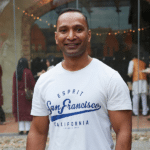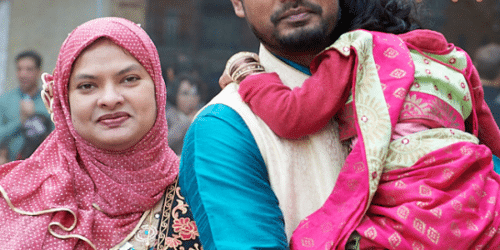
Explore the lives of Bengali and Sylheti-speaking communities living and working in the Cathedral and King St quarters of Norwich.
There are 14 excerpts in total for you to enjoy. You can download a Stories From the Quarter map here and embark on the walk yourself, or follow along online by listening to the story below. Explore Stories From the Quarter in full here →
Hear the story of Mahbubar Rahman, a multi-talented individual free thinker who doesn’t belong to any single tradition, who has built a family and life in Norwich outside of religion.
My name is Mahbubur Rahman, but everyone calls me Mash here. In a way, you could say that I have two names. I also have two birthdays. I was born on 14 April 1981, but when I finished secondary school after taking my final exams, the certificate said my date of birth was 12 July 1981. That mistake remained on all my certificates. I was born in a remote area of Sunamganj in the division of Sylhet. The area was surrounded by mighty rivers, lakes and wetlands, and travelling by boat was the only mode of transport then. My village is called Bhatipara. Since 1976, our father worked as the manager of Pubali Bank there. We were a middle-class family. When I was born, independent Bangladesh was about ten years old, a fragile post-war country. Our mother was trying to build her career as a family-planning visitor, which caused some friction within the family. She had quite a modern mindset and was somewhat ahead of her time and her situation. Her father did not want her to take the matriculation exam (school finals), but she adamantly continued her studies. People used to mock my father, commenting that it was his wife’s earnings that paid for his meals, as he couldn’t earn enough himself. Our father didn’t pay any heed to this. While our mother was in training, he took excellent care of us and gave us our first introduction to history, politics and socialism.
We are five siblings, one sister and four brothers. I am the third. My sister Momotaj Sultana is the eldest and is the headmistress of a government primary school. Our eldest brother was the vice president of NRB bank. He left banking and is now a full-time businessman. My younger brother is the assistant manager of SIBL bank, and his wife is a doctor. My youngest brother lives with his wife in Portugal, he is a businessman. Each of my siblings were smart at their studies, I was the weakest. As both our parents worked, we shared various household chores like serving food, washing clothes, etc. We used to eat together. That kind of happy chaos cannot be forgotten.
During my stay in Bangladesh, I realised that although I saw myself as a free thinker, most people considered me to be an atheist. Many people in my own family and society were not able to tolerate my liberal philosophy of life. My free-thinking, atheist friends were being attacked and even hacked to death by Islamic fundamentalists. People were not giving basic human respect to others, and there was no equality in society. Having money was everything. Fear entered my mind. At that time, I was very confident; I was doing business, working in a bank, working on a newspaper called Jayjay Din, and I was also the president of Prothom Alo newspaper’s Sylhet Bandhu Sabha, an organisation made up of readers of that publication. I used to travel to different districts, raising people’s awareness of the importance and benefits of reading books and playing sports, and highlighting the devastating impact of drug addiction on individuals and society in general. You could say that it was during this period that I formed the habits of community engagement within the Bangladeshi population, which I still practise in Norwich to this day.
I arrived in London on 26 December 2011, it was Boxing Day. Until then I was mainly in Bangladesh. I moved into a rented house in Barking, but during the night a drunken spree broke out between the tenants. The next day I left that place to stay with my brother in Kent, then went straight to Birmingham. I studied business Administration there for the next six months. Eventually, the Home Office revoked my college. Then I went to Luton. It was there that I met Carlene Belsey, a young lady from Norwich. I moved to Norwich in June 2012, visited the seashore and coastal towns like Lowestoft, and enjoyed all the beautiful scenery there; some very kind-hearted people received me in Norwich. I also witnessed few racist incidents. Within three to four weeks, Carlene announced that she was pregnant. Three daughters were born to us in succession. Angel who is nine now, followed by Ava who is eight, and then Anjali who is six.
My grandfather Taimus Ali was born on 3 June 1912, and died on 21 February 1977. Joining in 1942, he served as a Naik in the British-Indian Army, and he fought for four years in World War II in Italy, France, and Africa. He received the Burma Medal. The horrors of war had a profoundly detrimental effect on his mental health. In 1963 he came to Birmingham in Britain on a voucher visa and started working. He returned to Bangladesh (then East Pakistan) in 1970. His passport was stolen in Bangladesh during the 1971 war, and he was unable to return to Britain.
In Norwich, I first worked in recycling, then at Bernard Matthews, then in printing. My experience of running a brokerage house back in Bangladesh went on to prove very useful in my new life here. I started my business in Norwich in 2014, but in 2018 everything fell apart: I not only got divorced, the court even forced me to leave my own house. Suddenly I had to cope with the loss of my home, my family, and even the right to see my own children all at the same time! My immigration status became an issue as well. At that time, I was introduced to the National Centre for Writing through my great friend Annelli Clarke.
I personally do not belong to any single tradition. I am just as much from Sylhet, as from Dhaka, and I belong to Norwich as well. My daughters used to fall asleep listening to Bengali lullabies. They have met my parents only once in their lives. I had no say in choosing what would be their mother tongue, neither did I want to impose religion on them. It was after being in Norwich for a while that I realised that Bengalis were largely underrepresented here. I decided to chat with Chris Gribble at National Centre for Writing and got involved in their ‘Bengali Stories and Stories from the Quarter’ project. At first, I did not interact much with the Bengalis here. I wasn’t sure how they would react to my lifestyle, as I’m not religious and even go to pubs and clubs and attend western festivals. I thought they may view me as a potentially bad influence on their children. I used to deliver in Wroxham, where I met Dr Moyen Uddin and got to know some other Bengali people through him, and eventually I formed close relationships. Also, I play local cricket in the Norfolk Cricket league. I took a Journalism course at University of the Arts London and an online philosophy course at University of Edenborough. These, in conjunction with the NCW projects, increased my scope of work for the Bengali community and society in general.
My kids are too little to understand the project yet, but I still bring them to these events. Maybe in the future they will understand how lives were lived, stories were created, and memories were made in our community. For now, they just listen to music with other children on the project. If after twenty years they can recognise any imprints in themselves, only then will I be able to say that we were successful in establishing a real connection.
Read Mahbubar’s story in Bengali →
Listen to Mahbubar’s story in Bengali →
Listen to Mahbubar’s full story in English →
 Mahbubur Rahman, also known as Mash, was born in Sunamganj, in the Sylhet Division of north-eastern Bangladesh. He arrived to England in December 2011, and lived in Barking, Birmingham and Luton before moving to Norwich in 2012. He currently runs his own printing business, and enjoys playing cricket and spending time with his three daughters.
Mahbubur Rahman, also known as Mash, was born in Sunamganj, in the Sylhet Division of north-eastern Bangladesh. He arrived to England in December 2011, and lived in Barking, Birmingham and Luton before moving to Norwich in 2012. He currently runs his own printing business, and enjoys playing cricket and spending time with his three daughters.
Stories From the Quarter is a National Centre for Writing project in partnership with Norfolk Record Office, funded by National Lottery Heritage Fund.
![]()
![]()
You may also like...
Rahnuma Sultana (Stories From the Quarter)
‘Norwich is very beautiful; except for our native country, there is nowhere closest to our heart, we don’t want to go anywhere else.’

13th October 2023
Ashish K Kundu (Stories From the Quarter)
‘This is my story. A true fairy tale of a man born in faraway Bangladesh who somehow crossed the gulf from there all the way to Norwich.’

13th October 2023
Shiblee Sayed (Stories From the Quarter)
‘I welcome this initiative of the National Centre for Writing (NCW) to preserve the stories of our Bengali community. Through this project, generations will come to know how we Bengalis grew up here, how our struggles were fought.’

13th October 2023






